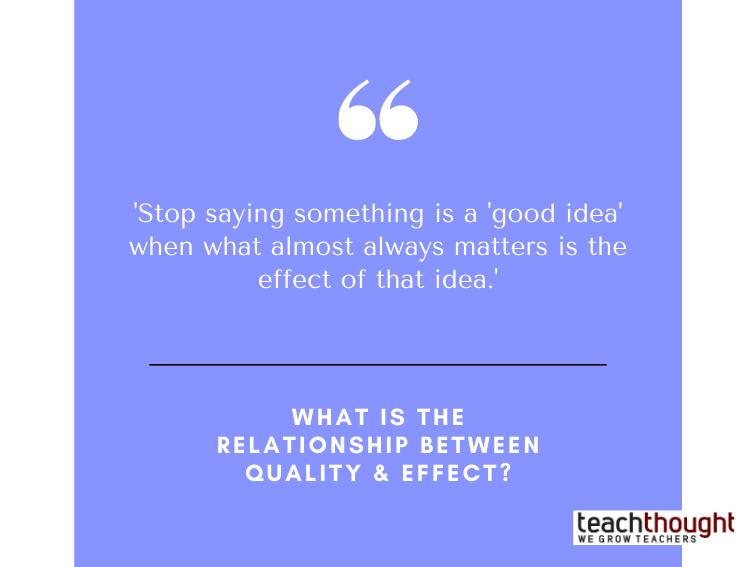
What Is The Relationship Between Quality And Effect?
by Terry Heick
I was thinking today about ‘quality.’
This got me thinking about ‘Zen and the Art of Motorcycle Maintenance‘ (affiliate link), which ended in a conversation with my son about politics.
As I mentioned in the tweet below, I’ve written somewhere about evaluating ideas by their effect. If I recall correctly, I said something to the effect of, ‘Stop saying something is a ‘good idea’ when what almost always matters is the effect of that idea.
Is that a good question? Well, what was the effect of that question?
Is that a ‘good school’? How does it affect its students and community?
Of course, nothing is that simple and there are exceptions. Further, there is the trouble of separating cause and effect as well as the less obvious effects of a thing. Or when something starts out with mostly negative effects but then, over time, the effects become more ‘good.’
Continuing, who gets to decide which effects are ‘good’ and which are not? There are also categories of effect: short-term and long-term; obvious and less obvious; crude and nuanced; local vs global, micro vs macro; individual vs effect; human and non-human; alterable and unalterable.
And so on.
This can obviously get philosophical fast so I’ll stop here. But to answer the titular question, the relationship between quality and effect is somewhat causal and there certainly is correlation but that’s not exactly it so I’ll just say that the relationship between quality and effect is–well, it’s worth understanding.
Here are the tweets and below the tweets is an excerpt from Robert Pirsig’s book, Zen and the Art of Motorcycle Maintenance.
What Is Quality? An Excerpt From Zen and the Art of Motorcycle Maintenance
As for an excerpt from ZAMM about quality, see below:
“The movement from this to his enquiry into Quality took place because of a
sinister aspect of grading that the withholding of grades exposed. Grades
really cover up failure to teach. A bad instructor can go through an entire
quarter leaving absolutely nothing memorable in the minds of his class, curve
out the scores on an irrelevant test, and leave the impression that some have
learned and some have not. But if the grades are removed the class is forced to
wonder each day what it’s really learning. The questions, What’s being taught?
What’s the goal? How do the lectures and assignments accomplish the goal?
become ominous. The removal of grades exposes a huge and frightening
vacuum.
What was Phædrus trying to do, anyway? This question became more and
more imperative as he went on. The answer that had seemed right when he
started now made less and less sense. He had wanted his students to become
creative by deciding for themselves what was good writing instead of asking
him all the time. The real purpose of withholding the grades was to force them
to look within themselves, the only place they would ever get a really right answer.
But now this made no sense. If they already knew what was good and bad,
there was no reason for them to take the course in the first place. The fact that
they were there as students presumed they did not know what was good or
bad. That was his job as instructor…to tell them what was good or bad. The
whole idea of individual creativity and expression in the classroom was really
basically opposed to the whole idea of the University.”
You can find the full book here–on Kindle, for example.